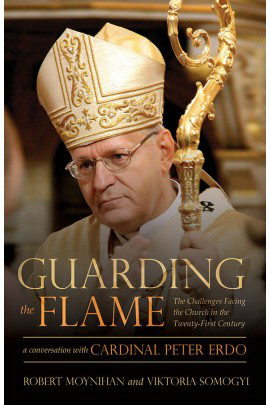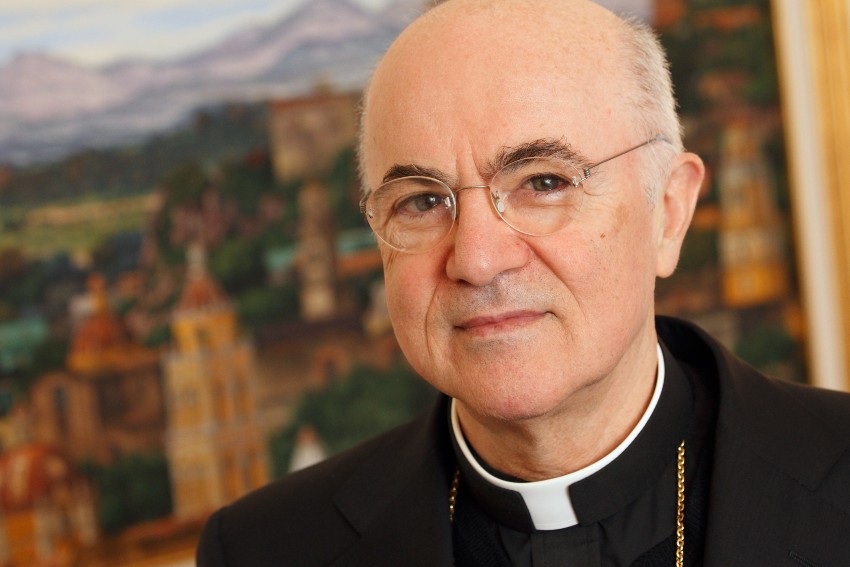
Above, the cover of a new book I have just published. It is the English translation (done by my son, Christopher Hart-Moynihan, an expert in the Italian and Russian languages) of a book-length interview with the thoughtful, learned Hungarian cardinal Peter Erdo, 66 (Erdo will turn 67 in five days, on June 25). Erdo is the archbishop of Esztergom-Budapest and the Primate of Hungary. He is regarded as one of the leading cardinals in Europe and the world.
I prepared the original Italian edition of the book, published by the Vatican Press (Libreria Editrice Vaticana, link) together with Hungarian Vatican Radio correspondent Viktoria Somogyi (who recently completed a prize-winning film on the large number of America’s under-used Catholic churches in recent years being closed and sold off). Here is a link to an Italian text introducing the Italian edition published in Osservatore Romano on September 5, 2015, by Cardinal Angelo Sodano (link).
To purchase a copy of this new book on Cardinal Erdo, you may do one of three things:
(1) Go to the publisher’s website (link)
(2) Go to the Amazon website and order the book there: (link)
(3) Write back to me by return email, including a complete mailing address and phone number, tell me how many copies you would like, and I will send you one or more signed copies at the cover price of $27.95, plus $5 per order for shipping and handling.—RM
The Sentinel (The Watchman)
In the 33rd chapter of the Book of Ezechiel there appears a famous passage about a sentinel, sometimes translated as “the watchman” — the one who stands guard throughout the night as the city sleeps to protect it from enemies, to keep it safe.
Here is the passage from the Prophet Ezechiel, Chapter 33:
1 And the word of the LORD came to me, saying,
2 “Son of man, speak to the sons of your people and say to them, ‘If I bring a sword upon a land, and the people of the land take one man from among them and make him their watchman, 3 and he sees the sword coming upon the land and blows on the trumpet and warns the people, 4 then he who hears the sound of the trumpet and does not take warning, and a sword comes and takes him away, his blood will be on his own head.
5 ‘He heard the sound of the trumpet but did not take warning; his blood will be on himself. But had he taken warning, he would have delivered his life.
6 ‘But if the watchman sees the sword coming and does not blow the trumpet and the people are not warned, and a sword comes and takes a person from them, he is taken away in his iniquity; but his blood I will require from the watchman’s hand.’
7 “Now as for you, son of man, I have appointed you a watchman for the house of Israel; so you will hear a message from My mouth and give them warning from Me.
8 “When I say to the wicked, ‘O wicked man, you will surely die,’ and you do not speak to warn the wicked from his way, that wicked man shall die in his iniquity, but his blood I will require from your hand.
9 “But if you on your part warn a wicked man to turn from his way and he does not turn from his way, he will die in his iniquity, but you have delivered your life.”
Cardinal Erdo is a type of Ezechiel’s watchman.
With extraordinary calm and patience, Erdo listened to my questions about the challenges facing the Christian faith in our time, and, to question after question, for hour upon hour — we were meeting in Budapest — he provided answers to them.
Erdo lived under a communist regime from his birth in 1952 until 1991, almost 40 years. He was formed within that culture. And yet, he was formed well also in Christian faith and culture. He became a distinguished canon lawyer — an expert in the frame of laws which regulates the life of the Church, and protects the rights of those in the Church from arbitrary power (one of the great achievements of canon law).
His answers to my questions were in keeping with the perennial doctrinal tradition of the Church. In fact, I have not met a cardinal with a wider and deeper knowledge of the doctrinal and cultural development of the Catholic Church than Erdo.
At the same time, Erdo is a simple, humble man, despite his great intellect. He was born a twin (his twin was a boy, his brother), and he grew up in an ordinary family in Budapest (his twin brother passed away about five years ago).
In 1956, as the Soviet army ruthlessly put down the October Hungarian rebellion, with the loss of some 20,000 Hungarian lives (and no visible support from the United States), a tank canon sent a charge blasting into the living room of the Erdo family’s apartment, and destroyed his father’s meticulously kept library. For the rest of his life, Erdo has, in a certain sense, attempted to rebuild his father’s library, though in differing ways and locations. When I was with him for several days in Budapest, a package of books would arrive each day from various parts of Europe (“For our diocesan library,” Erdo would say).
“They would have trampled the Rosary”
Erdo has also been, literally, a sentinel, a soldier standing watch.
“Yes,” he told me, “I had to do a year of military service.
“During this year, I noticed that some students of theology who were together with us carried rosaries. This was a bit risky because it was forbidden, and if they had found one, perhaps they would have punished the soldier, and then they would have trampled the rosary. So I thought, ‘I have ten fingers, I don’t need to carry the rosary with me and take the risk.’
“But then I discovered another rosary during the long hours of the night watch when we would stand guard with a Kalishnikov. The Kalishnikov had ten holes, and over these ten holes in the side of the Kalishnikov, I could quietly pray the rosary, and it was very nice. I never would skip even one Ave Maria.”
Special note
Seeking collaborators: I would like to ask some of the readers of these letters — which will remain free — to consider joining me as I prepare to travel in an effort to conduct in-depth interviews with various Churchmen, including two men whom I have known for many years, one a former cardinal, the other a controversial archbishop. You may help to sponsor this work by becoming a friend and supporter of these Letters (here is a link to the donation page: link.) Even quite small monthly donations (for example, $2.50 per month, more or less the price of one cup of coffee) would be very much appreciated, and would help to cover the costs of travel and filing reports (these emails cannot be mailed without paying an email server, and they cost more than $2,000 per year just to email; this is one reason why I do not send the emails as often as I might; they simply cost too much to send). —RM
Where is the Catholic Church going?
Guarding the Flame: The Challenges Facing the Church in the Twenty-First Century: A Conversation With Cardinal Peter Erdő
By Robert Moynihan and Viktoria Somogyi
How will the Church face the challenges of the 21st century? Do the recent advances in modern technology pose a threat to the human soul?
In this wide-ranging, candid conversation, Cardinal Péter Erdő, Archbishop of Budapest, Hungary, one of the most respected cardinals in the Catholic Church, speaks with Dr. Robert Moynihan, founder and editor of Inside the Vatican magazine, about the Catholic Church’s place in an increasingly secularized world.
As the two-time president of the Council of the Episcopal Conferences of Europe, Erdő is the leading bishop of Europe. And as Europe has descended into a deep secularism—more pronounced and rapid even than in the United States—Erdő is uniquely positioned and qualified to identify and tackle the issues that secularism presents.
Here, for the first time in in one place, the cardinal speaks forthrightly about the need to “guard the flame” of the traditional Christian faith in the face of all temptations and obstacles. Guarding the Flame is a courageous call to remain faithful to the faith handed down from the Apostles, whatever the cost.
Cardinal Péter Erdő, Archbishop of Esztergom-Budapest and Primate of Hungary, was born in Budapest on 25 June 1952, the first of six children. He was created Cardinal by Pope John Paul II in 2003. He has published more 250 articles and 25 books on Canon Law, as well as other spiritual works.
Robert Moynihan (Harvard College, B.A.,1977 and Yale University, Ph.D., 1988) founded Inside the Vatican magazine in 1993. He has covered the Vatican and Church affairs for more than 30 years and is the author of books on Pope Benedict XVI and Pope Francis.
Viktoria Somogyi, born in Hungary, has lived and worked in Rome at the Hungarian language desk of Vatican Radio. She studied International Relations at the University of Rome.









Facebook Comments